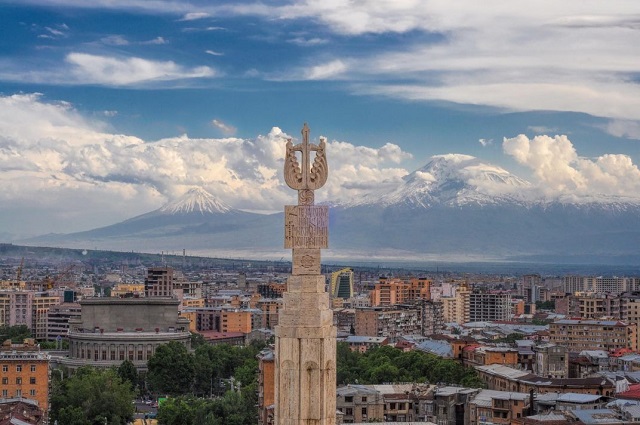Armenia is trying to find ways out of a crisis currently, and everyone is trying to have their own impact on finding those methods. We must pay tribute to the former Minister of Foreign Affairs, Vartan Oskanian, who carefully launched the practical debate by publishing an article titled, ‘It is Necessary to Work in Three Directions.’ In one of his speeches, Prime Minister Nikol Pashinyan also stated that we should start talking about the future, but for objective or subjective reasons, he did not say anything else- at least, not at the moment. And thus, regardless of the attitudes there are or there may be towards the role of Vartan Oskanian, who led Armenian diplomacy during Robert Kocharyan’s administration- whose negative attributes, by the way, are not so unfounded- in any case, several important ideas he mentioned deserve attention. So, what did Oskanian say? “The train of foreign policy, especially processes surrounding Nagorno-Karabakh, has started moving. Now, as it starts to gain momentum, instead of walking beside it to try and get inside, we have stood still. That train will leave the station soon if we don’t run quickly and try to get inside. In order to do that, we need to work in three directions- towards diplomacy, military, and international law,” the former minister said.
Concluding his statement with some important proposals in the aforementioned directions, Oskanian emphasized, “If we want our opponents, allies, and neighbors, as well as the international community, to listen to us, respect us, and take as seriously as a player in the region, it is necessary for us to work in those directions quickly and for us to show results as quickly as possible. Moreover, if this domestic stubbornness and external idleness continue, I truly believe that the rest of Artsakh will fall under the threat of suffering the same fate as Nakhichevan, and Syunik will be emptied and potentially lost as well.” Without having any intention of arguing against what he wrote since there is nothing to essentially argue against- even more, I am prepared to sign under what he wrote- I still would like to make a few notes regarding the entire picture of what we need to do.
Superhuman efforts will be necessary in order to ensure certain breakthroughs in the directions Vartan Oskanian mentioned- diplomacy, military, and international law. In turn, this also implies that significant efforts also must be made in a number of other strategic areas, such as science, education, and economy, which will require large-scale investments and institutional efforts. It is obvious that this complex level of work is possible in one case: when the state as a system is healthy from within. However, it is also obvious that our state is currently completely corrupted in the broadest and most plausible sense of the word, and at least there is a pan-Armenian consensus on that issue.
Refraining from mentioning the people who allowed this sad diagnosis to happen, and continuing to look ahead, it must be stated that a state with such a rotten ‘core’ cannot reach its goals and it cannot work in any of the directions that Oskanian stated. In that case, snap parliamentary elections and ideas about constitutional amendments are very healthy from the perspective of giving the state an opportunity to come out of this crisis and giving society a new impetus. However, these processes will remain as an end in themselves if they do not serve to provide some vision: for what, to serve what goal, and to solve what problem? The transition to, say, a semi-presidential system can be made for more effective decision-making and implementation. However, a question arises: decisions about what? What vision will these decisions serve? The same goes for snap elections. New authorities will be given mandates as a result of new elections. However, this also causes a question to arise: what issue will be solved? The answer to that question should be outlined starting today no matter how much ‘verbal garbage’ has flooded this country, and it must become the most important topic of pre-election debates. In the end, we must understand what our vision is for Armenia in 2025, and what kind of Armenia our political actions will lead to in 2025 in the most comprehensive sense of the word. We do not have any internal agreements as far as what we won’t do, and without that, the question of what we will do remains unanswered. Why 2025 specifically? Because that is when the timeline for the Russian peacekeepers’ deployment in Artsakh ends according to the agreement.
Read also
Moreover, processes may take place even earlier that will simply put us in a bad situation within a few days at a time that is not suitable for us, which has happened twice already over the past hundred years. At the same time, the issues pointed out by Oskanian are important from the perspective of formulating a vision, and not being armed with that vision, not having a steering wheel and a sail, can cause any event to turn into a force majeure for us and have a catastrophic end. And so, the forthcoming snap elections may be the first vital step on the road to overcoming the crisis, but only if one important condition is met: those elections must result in the formulation of that vision, which will receive the majority of votes from society. If that is absent, the election process in these current political conditions will be another wasted opportunity from the beginning, the resources of which we simply no longer have. Therefore, there is only one way out: when looking to the future, it is important to start talking and to honestly reflect on the mistakes of the past. And, it is important to learn how to listen.
Ruben Mehrabyan
Photo from the Smithsonian Magazine


























































